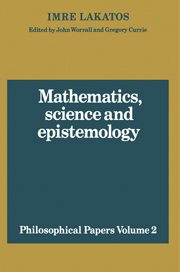Book contents
- Frontmatter
- Contents
- Editors' introduction
- PART 1 PHILOSOPHY OF MATHEMATICS
- PART 2 CRITICAL PAPERS
- 6 The problem of appraising scientific theories: three approaches
- 7 Necessity, Kneale and Popper
- 8 Changes in the problem of inductive logic
- 9 On Popperian historiography
- 10 Anomalies versus ‘crucial experiments’ (a rejoinder to Professor Grünbaum)
- 11 Understanding Toulmin
- PART 3 SCIENCE AND EDUCATION
- References
- Lakatos bibliography
- Indexes
7 - Necessity, Kneale and Popper
Published online by Cambridge University Press: 09 January 2010
- Frontmatter
- Contents
- Editors' introduction
- PART 1 PHILOSOPHY OF MATHEMATICS
- PART 2 CRITICAL PAPERS
- 6 The problem of appraising scientific theories: three approaches
- 7 Necessity, Kneale and Popper
- 8 Changes in the problem of inductive logic
- 9 On Popperian historiography
- 10 Anomalies versus ‘crucial experiments’ (a rejoinder to Professor Grünbaum)
- 11 Understanding Toulmin
- PART 3 SCIENCE AND EDUCATION
- References
- Lakatos bibliography
- Indexes
Summary
The problem [of natural necessity] before us arises on at least two levels: on an ontological and on an epistemological-methodological level. The fact that no proper attention has been given to this distinction is responsible for at least some of the confusion surrounding the problem.
Professor Kneale's paper is a new contribution to a discussion about natural necessity which has been going on in the last ten years between him, Professor Popper, and other philosophers. I shall try to give a critical summary of their discussion.
THE ONTOLOGICAL LEVEL
According to Professor Kneale, God may have faced the choice between creating a physical world and not creating a physical world, but once this choice was made, He was no longer free to choose the form, or the structure of the world – just as a poet who has chosen to write a sonnet cannot but write it in sonnet form. So God was not free to determine the laws of nature, just as the sonnet writer is not free to determine the laws of the sonnet. God of course had quite a lot of freedom to fill in the contents of the world within this necessary framework; what He could choose freely – the contents of the sonnet – were later called the initial conditions.
According to Professor Popper, God was completely free to choose any law of nature which occurred to Him at that moment. He dictated – at His pleasure – the Book of Nature, containing the Natural Laws, but left it to his angels to play around with initial conditions, insofar as they were not prohibited by some Natural Law.
- Type
- Chapter
- Information
- Mathematics, Science and Epistemology , pp. 121 - 127Publisher: Cambridge University PressPrint publication year: 1978



